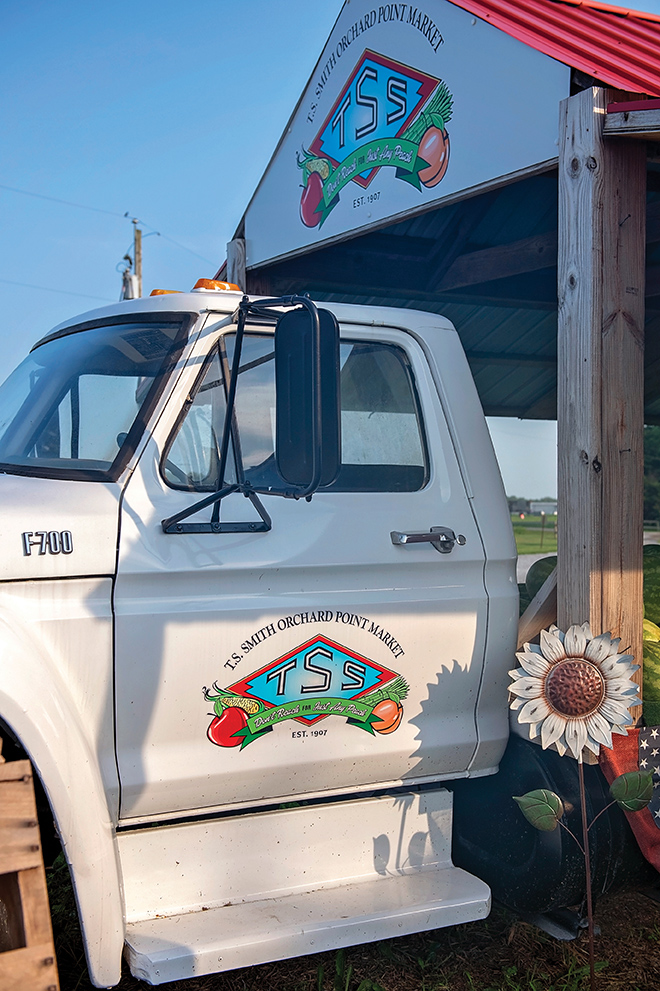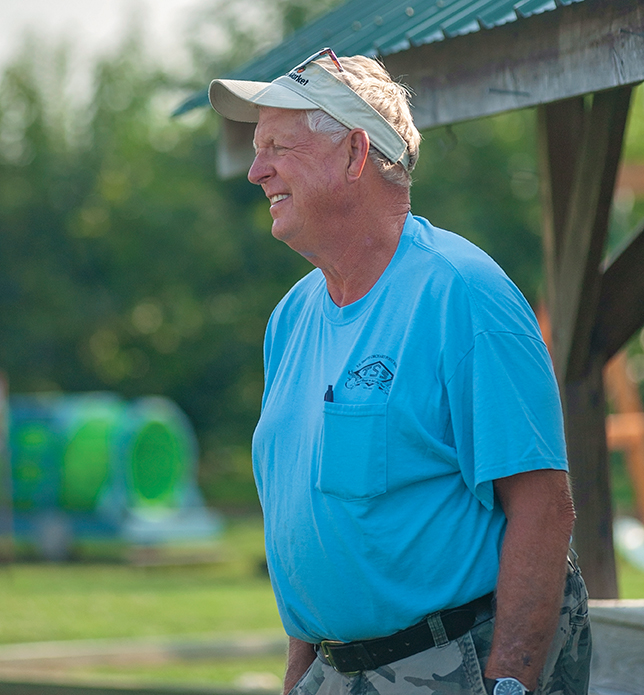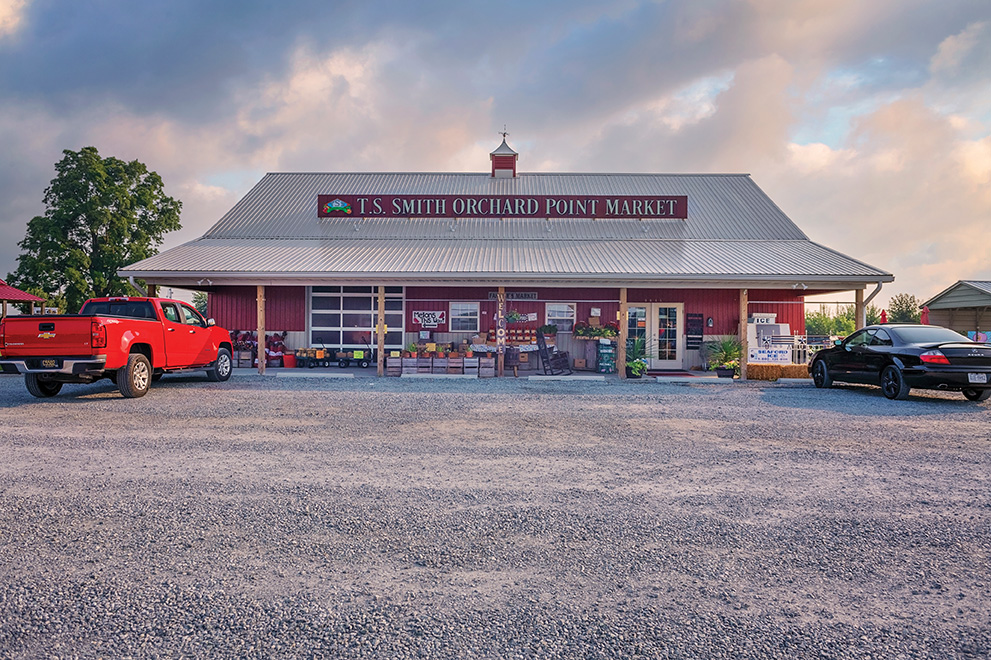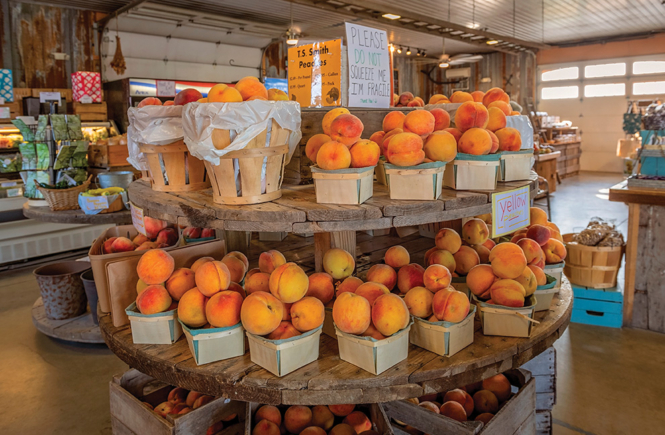At T.S. Smith & Sons, generations have been accompanied by change, yet pride in the product remains the law of the land
Interview by Ian Post | Photography by Pamela Aquilani
Right along Route 13 in Bridgeville, some of the Peninsula’s best peaches can be found at Delmarva’s oldest commercial apple orchard, T.S. Smith & Sons. With his market, vintage trucks, you-pick fields and playground area surrounded by hundreds of acres of farmland, owner Charlie Smith and I talked about his family’s historic orchard. While some Sussex friends may know T.S. Smith & Sons for their annual participation in the Apple Scrapple Festival, Charlie clearly prides himself on the quality of his family’s peaches.
As I perused the aisles of the marketplace, unable to resist buying a grilled-peach grilled cheese, peach ice cream and some peach jam for home, Charlie’s business motto replayed in my head as I grabbed a bag of fresh fruit: “Don’t reach for just any peach.”


PEACHY KEEN Charlie Smith said peaches at T.S. Smith & Sons are tree-ripened fruit, something that can’t be had at retail outlets.
The farm has been around since 1907. Have you all been growing peaches here since then?
Well, my great-grandfather, T.S. Smith, started in the berry business, with a lot of strawberries. He ran a general store in town and a doctor advised him, believe it or not, to find a new occupation. So, he got into farming, and then the highway was built through this field in the 1950s, which gave us acreage on this corner. In the ’20s and ’30s, we were big growers of asparagus and tomatoes, and we packed and shipped those. Then, I believe it was in the ’30s and ’40s, we planted several hundred acres of peaches — and we still grow peaches to this day. Not on that scale by any means, but peaches do very well in this climate. We’re blessed this year [2021] to have one of the best crops I’ve had in years.
Why do you think that is?
Just a combination of Mother Nature and luck. Some years, I think I can do everything wrong, yet everything turns out right. And then, vice versa: I do everything right, and everything turns out wrong. It seems to be out of our hands, but you know, global warming has presented its own set of challenges, especially for my apples. I’m also an apple grower, and they’re affected more so than the peaches. They’re maturing too rapidly and spoiling on the tree before they’re really ready to harvest. You really gotta plant the varieties that can tolerate our climate.
We’ve been fortunate that we’ve been diversified over the years and able to survive. You know, I wouldn’t say we’re wildly successful, but we’ve all made a living — myself and my brothers and people before me, my father, grandfather and great-grandfather. We put all our farm in farmland preservation, so it can never be developed. It’ll be farmland into perpetuity.
What makes T.S. Smith and Sons peaches special?
We pride ourselves on having a tree-ripe piece of fruit. I try to pick it so that it’s only one or two days away from being soft and delicious… where you have to wear a bib to eat it or hold your head over the sink, you know? And that’s what we pride ourselves on, because you can’t get tree-ripened fruit at retail outlets. Those taste like eating your shoe.

When did you start developing your marketplace items, like salsas, applesauce, jam, etc.?
I’ve always done that. We’ve had the farm market over there [down the road by the packing house], which came about after Hurricane Hazel, in 1954, when all the apples were blown off the trees. We took a sledge with mules, got all the apples up, and we put them out there on the porch with the packing house for 50 cents a basket.
When I came back to the farm after college in the ’70s, I redid the farm and put a market over here because of the traffic, and it’s worked out great. We got into apple-cider doughnuts in the ’80s, and I have a small bakery here where I sell ice cream, have a deli — and it all kind of fits together.
What are some T.S. Smith & Sons family legends?
One of the last surviving members of the second generation, he’s almost 90 now, remembers when we used to pack a lot of summertime apple varieties and put them on railroad cars up to Canada in the fall. They used to take the cull apples, which were the ones you couldn’t pack, and dump them out behind the house. Now, you can take them to a processor and get applesauce or make juice out of them and get something. So, my uncle said, “Grandfather would never let the boys make cider,” because he was very religious, a teetotaler. He said, “I know they’re gonna make applejack.” After his grandfather died, in 1949, the boys started making whiskey barrels of applejack cider in 1950. CS


1 comment
How far are you from claymont? I love peaches and always have problems buying ripe ones